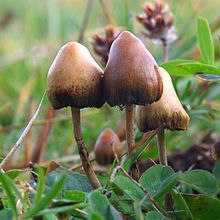Hallucinogenic Mushrooms May Help Treat Depression, If Britain's Regulators Get Out Of The Way

Lingering regulatory burdens have delayed the world's first clinical trial of hallucinogenic mushrooms to treat depression, a British scientist said today.
Though researchers have received funding and approval from an ethics board, legal requirements of pharmaceutical companies have stalled the project, said David Nutt, president of the British Neuroscience Association, who is a professor at Imperial College London.
"We live in a world of insanity in terms of regulating drugs," he said at a neuroscience conference in London.
While in the past governments experimented with hallucinogenic drugs as a form of weaponry, researchers today appear more interested in using such Schedule I drugs as medicine, in particular to treat severe forms of depression.
Nutt previously conducted smaller-scale experimentation on healthy volunteers to find that psilocybin, the psychoactive ingredient in mushrooms, may alleviate symptoms of severe depression in patients unresponsive to other therapies. Presently, the United Nations and other governments classify the drug as Schedule I, with high potential for recreational abuse and no redeeming medicinal value.
Classified thus by the UN's 1971 convention on psychotropic substances, the drug is illegal in Britain and - and the United States - and cannot be prescribed by physicians for off-label indications, such as the treatment of depression. Presently, the British government requires researchers to secure a license to use the drug in clinical trials, with the manufacture of a synthetic version also tightly regulated by the European Union.
Given the regulatory hurdles, Nutt has been unable to find a manufacturer to produce the synthetic version for the trial.
"Finding companies who could manufacture the drug and who are prepared to go through the regulatory hoops to get the license, which can take up to a year and triple the price, is proving very difficult," he said.
At the conference, Nutt described regulatory authorities in Britain and Europe as having a "primitive, old-fashioned attitude that Schedule 1 drugs could never have therapeutic potential," despite a body of research suggesting effectiveness in helping some patients with psychiatric conditions.
In the U.S., researchers continue to explore the possibility of not only using hallucinogenic drugs as a first-line battlefield treatment for injured combatants but as a treatment for post-traumatic stress disorder. In clinical trials, American researchers have seen positive results in using MDMA, a pure version of the drug known as ecstasy, in treating PTSD.
"What we are trying to do is to tap into the reservoir of under-researched illegal drugs to see if we can find new and beneficial uses for them in people whose lives are often severely affected by illnesses such as depression," Nutt said.
The drug may work on the brain by shuttering overactive firing in the anterior cingulate cortex, he said.
"Even in normal people, the more that part of the brain was switched off under the influence of the drug, the better they felt two weeks later. So there was a relationship between that transient switching off of the brain circuit and their subsequent mood," he said. "This is the basis on which we want to run the trial."
British authorities last month approved Nutt's proposed 60-person clinical trial to treat severe depression in patients who've attempted at least two previous treatments. The UK's Medical Research Council awarded $844,000 for the project.



























